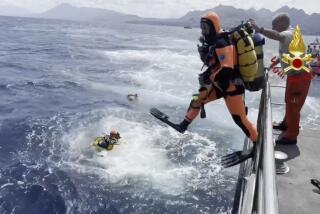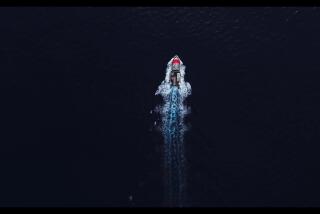Sailor’s Fate Clouded in Sail Around the World : Racing: Of the 20 yachts that left South Carolina last September, 12 finished and one was lost at sea. Harry Mitchell’s emergency beacon went off March 2, but no trace has been found of him or his boat.
- Share via
CHARLESTON, S.C. — The haze off the water plays tricks on the eye in these early days of summer--you can imagine the masts and blue hull of the yacht Henry Hornblower moving slowly up the Ashley River to safe harbor.
But it’s been more than four months since skipper Harry Mitchell and the 40-foot Hornblower were lost amid the mountainous seas and near-hurricane winds of the Southern Ocean.
The 70-year-old British sailor was pursuing his lifelong dream--to round Cape Horn under sail and wear the gold earring reserved for sailors who have made the stormy passage.
Mitchell, the oldest competitor in the BOC Challenge field, was making his third attempt at the single-handed around-the-world race.
Minoru Saito, the Japanese BOC skipper who had the last radio contact with Mitchell, said Mitchell kept his sense of humor, joking that he was using a sail the size of a handkerchief as the storm blew up.
Mitchell’s emergency beacon went off March 2, but no trace has been found of him or his yacht. Saito plans to sail to England this summer to fulfill a Japanese custom of sailing to the person’s home port to help the spirit return when someone is lost at sea.
Mitchell “would never discuss finishing the race,” said fellow British skipper Robin Davie, who was a few hundred miles ahead at the time. “He never ever took it for granted. Whether he had a feeling he might not, I don’t know.”
Of the 20 yachts that sailed from Charleston last September, 12 finished. Mitchell was the only sailor lost.
“The only way I can deal with it is to think Harry is still out there sailing,” said Diana, his wife of 43 years, from the couple’s home in the seaside town of Pembroke Park, England.
“I’m always used to Harry being away in the summer sailing. In the autumn and winter, it’s going to hit a lot more that he’s not coming back,” she said.
Those who knew him say Mitchell dreamed of sailing around the Horn since he stood as a lad on the docks in Portsmouth watching the last of the tall sailing ships arrive with their holds full of grain from Australia.
Once he even set off for Liverpool with the thought of going to sea, but the ship he planned to board sailed before he arrived.
He grew up to work in Canada for a defense contractor, maintaining electrical systems on fighter jets. Often, he would fly with the test pilots.
But it was later, when he was in his mid-40s and working in his family’s car-rental business, that he took up sailing.
Eight years ago, his first BOC attempt ended when his boat ran aground at the southern tip of New Zealand. Four years ago, he never started because his boat was damaged as he prepared to cross the Atlantic.
Mitchell, a gregarious man who gained something of a reputation for jumping into swimming pools naked at Charleston parties before the race, said it was never too late for anything in life.
“If I don’t sail around the horn before I’m 100, then it will be too late,” he said before the race this time.
Now retired, this father of two put his life savings into what would be his final BOC attempt. He neither had, nor sought, corporate sponsors.
His hobby was repairing old clocks. He wouldn’t accept defeat, either by the sea or by a timepiece’s intricate workings, his wife said.
“Even if it cost him more money to repair something than buy a new one, he would repair it--he had beaten it and it had not beaten him,” she said. “The third time at the BOC I thought Harry would be lucky, and I think he hoped that too.”
“Harry was a character who caught people’s imaginations,” said British journalist Paul Gelder, whose book on the BOC, “The Loneliest Race,” will be published in September. “People like an underdog. He wasn’t going to be a winner and he was up against impossible odds.”
Mitchell had no chance to win against the faster boats sponsored by backers with deep pockets. Always near the back of the fleet, he arrived in Cape Town, South Africa, as the front-runners were leaving on the second leg.
“But he was doing well for Harry” whose main competition was likely against himself, said Frank Farley, a psychologist at Temple University who has studied people with what he calls Type-T personalities--the “T” is for thrills--who generally take part in challenging individual events.
Richard Logan, whose book “Alone,” profiles those who have survived solitary ordeals, said people like Mitchell “find that coming to some kind of final knowing of the self isn’t possible. What does matter is the quest.”
Diana Mitchell put it another way: “He was happy he was doing the best he could with what he had and doing what he liked.”
More to Read
Sign up for The Wild
We’ll help you find the best places to hike, bike and run, as well as the perfect silent spots for meditation and yoga.
You may occasionally receive promotional content from the Los Angeles Times.






